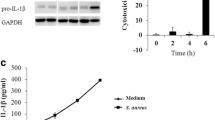Abstract
Background:
Barbiturates and propofol are used for deep sedation of patients with elevated intracranial pressure refractory to standard therapeutic regimens. Such patients often suffer from bacterial infections, which are most commonly caused by Staphylococcus aureus. Various interactions of anesthetics with components of the host defense have been documented, but very little is known about the influence on monocytes, which are a first-line defense against bacterial invasion. Therefore, we studied the effects of thiopental, methohexital, and propofol on monocyte phagocytosis using an in vitro whole blood model of viable S. aureus.
Materials and Methods:
Whole blood samples were preincubated with different concentrations of thiopental, methohexital, and propofol. Phagocytosis was stopped at different time points after addition of viable S. aureus. Monocytes then were stained with monoclonal antibodies for flow cytometric analysis of monocyte recruitment (ratio of ingesting monocytes). Furthermore, the fluorescence intensity of ingested bacteria served as semiquantitative measurement of phagocytosis activity.
Results:
Both barbiturates inhibited monocyte recruitment and phagocytosis activity concentration-dependently, whereas propofol did not affect any of the investigated parameters. At concentrations of 7.6 ×10-3 M thiopental or 1.1 × 10-3 M methohexital and greater, monocyte recruitment and phagocytosis activity were significantly inhibited. The calculated half-maximum inhibitory concentration (IC50) of thiopental was8.4 × 10-3 M for monocyte recruitment and 8.6 × 10-3 M for phagocytosis activity. The corresponding values for methohexital were 4.1 × 10-3 M and 1.1 × 10-3 M, respectively.
Conclusion:
The two barbiturates induce concentration-dependent inhibition of monocyte phagocytosis, whereas propofol is without effect. In combination with previously described effects on granulocyte function, these findings suggest that defense against bacterial infection might be reduced by barbiturates.
Similar content being viewed by others
Author information
Authors and Affiliations
Corresponding author
Additional information
The study was solely financed by institutional scientific budgets.
Rights and permissions
About this article
Cite this article
Ploppa, A., Kiefer, R.T., Nohé, B. et al. Monocyte Phagocytosis of Viable Staphylococcus aureus is Impaired by Barbiturates, but not by Propofol. Infection 36, 220–225 (2008). https://doi.org/10.1007/s15010-007-7240-3
Received:
Accepted:
Published:
Issue Date:
DOI: https://doi.org/10.1007/s15010-007-7240-3




